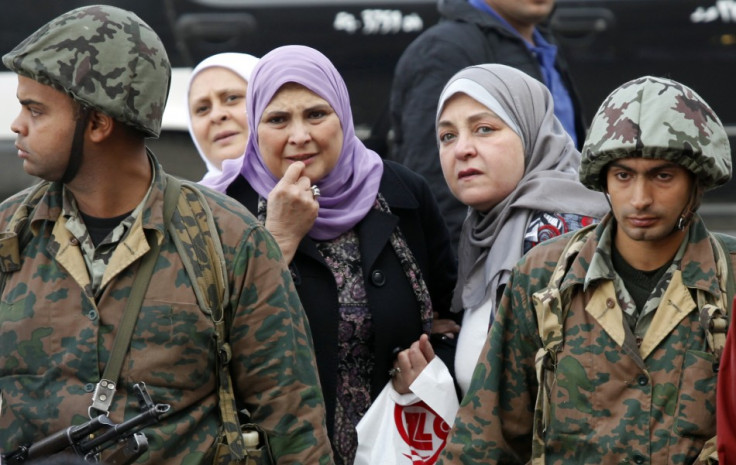"Virginity checks" forced on Egyptian protesters by Army after fall of Mubarak

A senior Egyptian general has admitted that "virginity checks" were performed on women arrested during the demonstrations of the Arab Spring in Egypt. The confirmation of the allegations, that were first brought up by Amnesty International, comes after the military authorities had repeatedly and firmly denied such claims.
In a report published weeks after the March 9 protest, Amnesty International writes: "Women have continued to suffer for raising their voices since Hosni Mubarak was ousted. At least 18 women held in military detention after army officers violently cleared Tahrir Square of protesters on 9 March said they were tortured. Women told Amnesty International were beaten, given electric shocks, strip-searched, forced to submit to "virginity checks" and were threatened with prostitution charges."
At that time, Maj. Amr Imam said 17 women had been arrested but denied allegations of both torture or "virginity tests."
However in the latest twist and as Egyptians grow increasingly suspicious of the transitional military regime, a general, who requested to remain anonymous said the virginity tests were conducted and defended the practice. Interviewed by CNN he said:
"The girls who were detained were not like your daughter or mine," the general said. "These were girls who had camped out in tents with male protesters in Tahrir Square, and we found in the tents Molotov cocktails and drugs."
According to the general the virginity checks were done as a preventive measure as the authorities allegedly feared that some of the women would claim they had been raped by Egyptian authorities.
"We didn't want them to say we had sexually assaulted or raped them, so we wanted to prove that they weren't virgins in the first place," the general said. "None of them were virgins."
Frighteningly, this demonstration occurred nearly a month after former President Hosni Mubarak was forced to step down. At that time, Egypt's military had already taken control of the state by setting up The Supreme Council of the Armed Forces and agreed to draft a new constitution and prepare for elections.
The March 9 protest occurred in Tahrir Square, a place that became the symbol of the Egyptian revolution as protesters assembled there on a daily basis. However the day remains known to be one of the most macabre of the protests as the Egyptian military directly targeted the protestors, dragging dozens of demonstrators from the square and through the gates of the landmark Egyptian Museum.
Salwa Hosseini, a 20-year-old hairdresser and one of the women named in the Amnesty report, told CNN how soldiers tied her up on the museum's grounds, forced her to the ground and slapped her, then shocked her with a stun gun while calling her a prostitute.
"They wanted to teach us a lesson," Hosseini said soon after the Amnesty report came out. "They wanted to make us feel that we do not have dignity."
The treatment got worse, Hosseini said, when she and the 16 other female prisoners were taken to a military detention centre in Heikstep, where she and several of other female detainees were subjected to a "virginity test."
"We did not agree for a male doctor to perform the test," she said, adding that the authorities forced her to comply by threatening her with more stun-gun shocks.
"I was going through a nervous breakdown at that moment," she recalled. "There was no one standing during the test, except for a woman and the male doctor. But several soldiers were standing behind us watching the backside of the bed. I think they had them standing there as witnesses."
The senior Egyptian general added the 149 people detained after the March 9 protest were subsequently tried in military courts, and most have been sentenced to a year in prison.
He also added that the authorities later revoked those sentences "when we discovered that some of the detainees had university degrees, so we decided to give them a second chance," he said.
Insisting that that the military council was determined to make Egypt's democratic transition a success he affirmed that "The date for handover to a civil government can't come soon enough for the ruling military council," "The army can't wait to return to its barracks and do what it does best -- protect the nation's borders."
However his intervention will certainly not reassure the Egyptian people who have become increasingly suspicious of the Supreme Council of the Armed Forces, as they fear reforms aiming at Egypt's transition to democracy have been extremely slow.
In fact many of the reforms taken by the new power can be said to go in the opposite direction as the emergency law has still not been lifted.
Also, on March 23, the regime banned all strikes and protests that "interfere with the economy or public life" and, imposed draconian punishments for those willing to defy the law.
The military, while putting on a pro-democracy façade has led numerous crackdowns on peaceful protests since the fall of Mubarak, and critics accuse it of failing to restore security in the streets or launch serious national dialogue on a clear path forward for Egypt.
Perhaps it is crucial to remember that Mubarak was untouchable for so long because he was the head of a regime that was protected by security and military forces that were seen as ruthless by Egyptians. The dictator has now fallen, but as long as the military rule, the dictatorship, it seems is still standing, albeit without its figurehead.
© Copyright IBTimes 2024. All rights reserved.





